New Orleans 2005
An obscured view of New Orleans.
The following is a description of New Orleans during a trip there in November of 2005 following the Katrina disaster. The pictures and accompanying editorials describe my state of mind that seemed to be constantly alternating between sadness, hope and anger. There weren't many emotions that were skipped. My comments about how the city and it's people are recovering, or not recovering as the case may be, are based upon growing up near the city of Chicago and wondering how that city and it's governmental agencies may have responded.
The city and it's residents may not like some of my comments but as incorrect as some of them may be, they are none the less, my perceptions. I do understand that it is unfair to judge many things as the "outsider" that I am. I would also feel it would be unfair to judge my comments/perceptions that you may agree with as correct, and those you do not agree with, as necessarily incorrect. Comments such as, "well, at least you got that right," will be met with my response of, what makes you so sure? I claim nothing I say here as a correct appraisal of the situation, only my perception. Even some of the pictures have been altered in their colors or tone an attempt to show them in a way similar to how I felt and what I saw.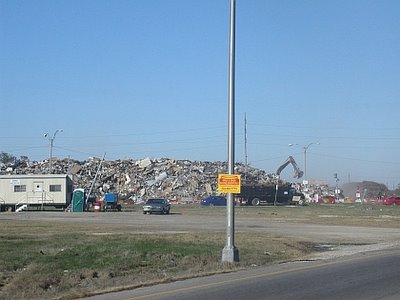
Although the widespread damage was evident long before crossing over into New Orleans, the picture to the left was one of the first things we saw as we entered the city. Debris was being moved from homes and businesses that were trying to clean up. It was relocated to staging grounds throughout the city, like this one. From there it would be reloaded into larger trucks and hauled away to landfills. These staging areas are along the median strips, called neutral ground in N.O., between the streets, and ran for blocks. They were several stories tall.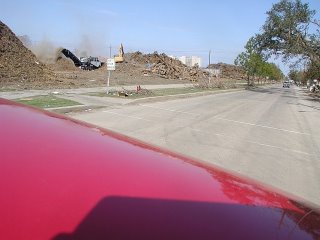 This is a view of another neutral ground area that is being used to transfer all the downed trees, many of them hundreds of years old, and turning them into mulch. I'm not sure what is being done with this mulch. Most likely being discarded due to unknown toxin contents. I imagine people would be selling small bags of this mulch on the street corners of Chicago, along with a "collectible" bottle of brown water.
This is a view of another neutral ground area that is being used to transfer all the downed trees, many of them hundreds of years old, and turning them into mulch. I'm not sure what is being done with this mulch. Most likely being discarded due to unknown toxin contents. I imagine people would be selling small bags of this mulch on the street corners of Chicago, along with a "collectible" bottle of brown water.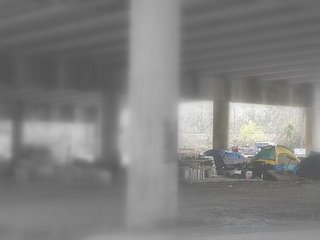 Tent cities. People from all over the country are coming to help. News agencies may be forgetting about the Gulf Coast people but America's people are not forgetting. There are no vacancies in hotels anywhere near the city itself. Volunteers and paid workers alike are forced to live in tents. Pitched on ground that had been saturated with salt water and toxins of all sorts. Many of them had been staying along the neutral ground areas in small tent cities but have been forced by the city to move out and spread around. Finding places like this one under a street viaduct. Other's are moving to private property offered by businesses that know how important these people are to the survival of the city. The city itself decided it was logical to begin charging these people, very large fees for camp sites, as if they were there to enjoy the view. Half the people of New Orleans are nowhere in sight. There are no residents to fill the jobs that need to be filled. People travel great distances at their own cost to help rebuild the city and they are now met with camp site fees as if they were bringing their families down for vacation. I had heard that the city was charging $350.00 per week for a place to pitch a tent. No wonder Burger King is offering $5000.00 bonuses to come and flip burgers. You need the extra cash to pay for the campsites.
Tent cities. People from all over the country are coming to help. News agencies may be forgetting about the Gulf Coast people but America's people are not forgetting. There are no vacancies in hotels anywhere near the city itself. Volunteers and paid workers alike are forced to live in tents. Pitched on ground that had been saturated with salt water and toxins of all sorts. Many of them had been staying along the neutral ground areas in small tent cities but have been forced by the city to move out and spread around. Finding places like this one under a street viaduct. Other's are moving to private property offered by businesses that know how important these people are to the survival of the city. The city itself decided it was logical to begin charging these people, very large fees for camp sites, as if they were there to enjoy the view. Half the people of New Orleans are nowhere in sight. There are no residents to fill the jobs that need to be filled. People travel great distances at their own cost to help rebuild the city and they are now met with camp site fees as if they were bringing their families down for vacation. I had heard that the city was charging $350.00 per week for a place to pitch a tent. No wonder Burger King is offering $5000.00 bonuses to come and flip burgers. You need the extra cash to pay for the campsites.
I have also heard that the reason that the people that used to live here, but are now scattered all over the country, can not return because there is no place for them to stay while they try to rebuild their city.
I guess these tents are good enough for the volunteers that are coming to work here, but not good enough for the people of New Orleans. I guess someone can just let those folks know when the city is rebuilt, so they can decide if they want to come home.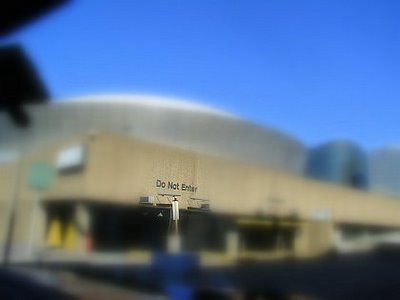 The Superdome and what turned out to be a warning about things to come. The N.O. Mayor says the city controlled buses were pre-positioned at a place where water had never flooded before. How could they know? Weren't you supposed to evacuate "before" they flooded? Maybe they didn't realize that New Orleans has never stopped sinking. Did it not occur to anyone in the Mayor's office that the areas that were above flood stage in 1932 or 1953 or 1963, just might be a little lower now?
The Superdome and what turned out to be a warning about things to come. The N.O. Mayor says the city controlled buses were pre-positioned at a place where water had never flooded before. How could they know? Weren't you supposed to evacuate "before" they flooded? Maybe they didn't realize that New Orleans has never stopped sinking. Did it not occur to anyone in the Mayor's office that the areas that were above flood stage in 1932 or 1953 or 1963, just might be a little lower now?
Maybe it would have been better to help transport the people out of New Orleans and then put the city owned service vehicles in the Superdome for safe keeping. It might have helped in the rebuilding process. At least the Superdome has a new roof already. Are you ready for some football New Orleans? How about the 200,000 people that don't have a roof over their heads?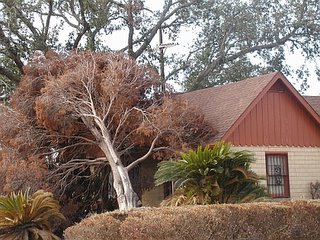 Working our way into the neighborhoods that suffered the greatest damage. The colors of the "greenery" which have all turned brown are not caused by fall setting in, something I would be used to coming from Illinois. The trees, bushes & grass have all been turned brown from sitting in a salt water bath.
Working our way into the neighborhoods that suffered the greatest damage. The colors of the "greenery" which have all turned brown are not caused by fall setting in, something I would be used to coming from Illinois. The trees, bushes & grass have all been turned brown from sitting in a salt water bath.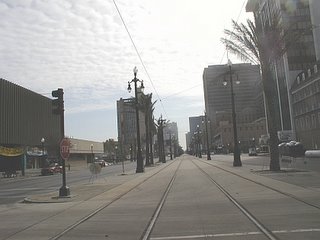 Entering the downtown area. Not much going on down here. Looks pretty deserted. At this point, at least one half of the city and surrounding areas are still without power. This street seems to be missing it's street cars. Although the power lines for the street cars are visibly still standing here, they are still down all over the city. In many areas, the tracks for the street cars are still littered with abandoned autos. I guess power wouldn't do them much good anyway. We didn't see any city crews working on the power lines....or the phone lines, or the power stations or anywhere for that matter. We did see one phone company truck, but it was parked out front of the phone company building.
Entering the downtown area. Not much going on down here. Looks pretty deserted. At this point, at least one half of the city and surrounding areas are still without power. This street seems to be missing it's street cars. Although the power lines for the street cars are visibly still standing here, they are still down all over the city. In many areas, the tracks for the street cars are still littered with abandoned autos. I guess power wouldn't do them much good anyway. We didn't see any city crews working on the power lines....or the phone lines, or the power stations or anywhere for that matter. We did see one phone company truck, but it was parked out front of the phone company building.
If this was Chicago, I think we'd see a slightly different situation. Mayor Daley threatens the power company with law suits and heads begin to roll if power on one street is out long enough to allow ice cream to melt. The power has been off here for three months. I know the cities vehicles have been damaged by the flood. I know this job is huge. No matter how large the job, it won't get fixed unless you start somewhere. Was it more important to get the roof on the Superdome put on, or roofs on people's homes? Was it more important to get the power on at Bourbon Street for the college kids that come to visit, or get the power on in a neighborhood so people can have enough light to clean their homes? I didn't go there for a football game or to get a lap dance. I came to help people return home. Can you please run an extension cord for me from one of the strip joints, over to the Lake View area?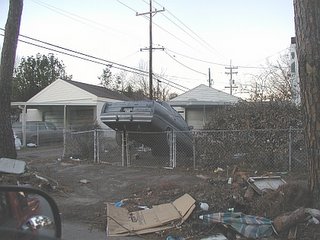 Cars and debris still litter the city. The last time this car was moved was 3 months ago. If I was the company that manufactured or installed this fence, I'd be running ads.
Cars and debris still litter the city. The last time this car was moved was 3 months ago. If I was the company that manufactured or installed this fence, I'd be running ads.
Who knows where this car floated in from. There are still thousands of cars littering the streets and yards of New Orleans. Left for insurance adjusters to look at and settle claims? Most have markings on them and have been seen by the adjusters. They are worthless after sitting in salt water for weeks on end. Who knows how long it will take to remove them. At the rate they are going though, based on the number of tow trucks seen working on the problem, I'd venture a guess of 10 to 12 years.
If this was Chicago on a snow parking ban afternoon, it would be 10 to 12 hours.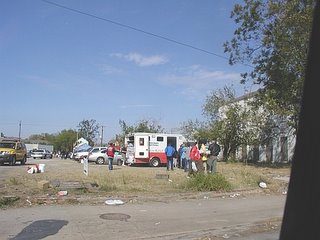 One of the Red Cross stations. Those are volunteers from Wisconsin feeding volunteers from Omaha, Portland and Boston. One of them being a guy that recently graduated from one of those "fancy" Ivy League Universities. He plans on being there for at least two years....volunteering. His career could wait. His desire to help could not.
One of the Red Cross stations. Those are volunteers from Wisconsin feeding volunteers from Omaha, Portland and Boston. One of them being a guy that recently graduated from one of those "fancy" Ivy League Universities. He plans on being there for at least two years....volunteering. His career could wait. His desire to help could not.
BTW, the Red Cross people working down in the streets, are basically living on the streets also. Living in trailers if they are lucky and in tents if not so lucky. The Red Cross executives though, are staying at the Marriott. By the way, if any Red Cross execs see this, the workers there asked me to please pass along the notion that these people of New Orleans do not need small mops and windex. They need shovels, wheel barrows, face masks that filter out mold spores and tools to tear out drywall.
Before going down, we all needed to get a series of shots as if we were going to a third world country. I'm not sure sections of N.O. would qualify. Is there a fourth world classification? Is there anywhere in the world that encompasses an area that once held 200,000 homes, where now you need shots, face masks and latex gloves before entering? Chernobyl?
Much of the city and the debris still scattered about, is covered with an eerie gray film. Similar to a Twilight Zone episode of a nuclear winter. Someone tell Burgess Meredith he can come out of his underground bunker.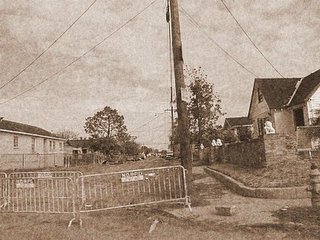 One entrance to the Lower Ninth Ward. Blockades, at each street, consisting of gates and National Guard troops. This area was still off limits except for bus tours for people that wanted to drive past what might be left of their home. Insurance adjusters needing to get in for a view before they turn down a claim. Those people that could afford national flood insurance usually couldn't afford enough to cover their loses. Most carried no insurance on any belongings. Most autos were not insured at all since you can't get flood insurance for your car, if you live in a flood plane.
One entrance to the Lower Ninth Ward. Blockades, at each street, consisting of gates and National Guard troops. This area was still off limits except for bus tours for people that wanted to drive past what might be left of their home. Insurance adjusters needing to get in for a view before they turn down a claim. Those people that could afford national flood insurance usually couldn't afford enough to cover their loses. Most carried no insurance on any belongings. Most autos were not insured at all since you can't get flood insurance for your car, if you live in a flood plane.
100 years of history lost?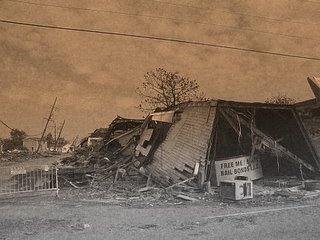
Or is it 200 years of history lost?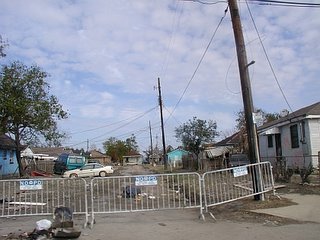 A view down one street in the 9th.
A view down one street in the 9th.
Notice the home sitting IN the street just to the right of the car. I know the lower 9th was the hardest hit and there is not much left. We weren't allowed in.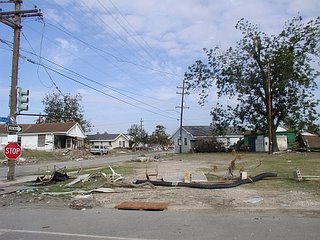
The only thing that kept the home on the right from making it to the street, was the electric pole.
Wires hang from the pole in the foreground.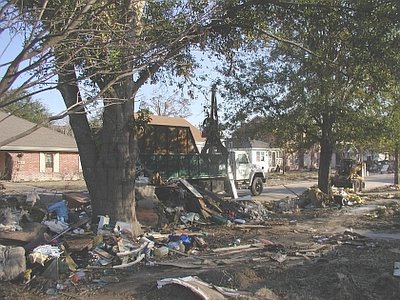
We were working at this home, stripping it of all personal belongings that had been ruined and stripping the interior down to the wooden framing. The truck and crew in the picture was from New Jersey. One of the lowlights of the trip played out on this street. The crew from New Jersey, and the crew from Chicago, catching a couple of looters, and turning them over to police. We knew they weren't working there, their hands and clothes were clean. They didn't put up much of a fight. It may have had something to do with the guy from Jersey being 6'4", 250 and sounding rather upset that he had to stop working to deal with these two low lifes. Whatever happened, this was NOT going to take him away from his job for long. He's trying to get his work done (anywhere from 2 to 4 years, he guesses) so he can return to his wife and young son. I hope that some day his son finds out that his dad was also a hero during his time in New Orleans. When I met Cole, he and his crew had been working for almost three months and had not yet seen a pay check. He was still doing his job with the respect for the people of New Orleans that they deserved. It wasn't his job to protect the property of people he did not know or even meet, as most homes here haven't seen their owners in three months. But if you're being a good neighbor, it doesn't matter if they aren't home. It doesn't matter that they are neighbors separated by 1000 miles. What matters to some people is doing the right thing. The people of New Orleans have been violated enough, in every way imaginable. They certainly don't deserve further violation by looters.
Each night at this site, we'd be met by the National Guard patrolling the streets. Met a nice kid that was taking time out of his education at Tulane to patrol the streets. I hope he's still a nice kid when this stint with the Guard is over. I imagine that enforcing Marshall Law in your own community, when you're 19 can have a dramatic effect on one's outlook on life. I suspect it will make him a better person, at least I hope it does.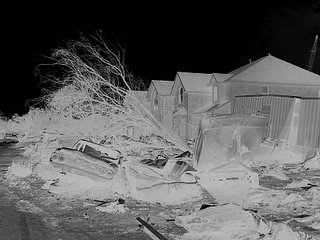
Entering an area next to one of the levee breaks. I thought a photo "negative" view might better explain not only the look of the area, but the feeling you get entering the area. This home now has a dead tree, a wrecked car, a boat and a damaged trailer sitting in what used to be a front yard. The blackened sky helps describe the feelings that surround the people that live(d) here.
A man stands next to the foundation of what used to be his home. The concrete is all that is left. The view of the tree in the center used to be blocked by a home.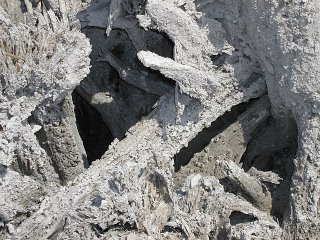
A close up of an uprooted tree's root system. The tree ripped from where it began growing most likely 200 years ago. Those are barnacles growing on the tree roots. The stump that remained was about 3 feet in diameter. This was not driftwood. Until 3 months ago, it was a living thing. Had probably watched over the early settlers in the area.
The sea has entered the city. A thousand years from now, archaeologists will have a difficult time trying to figure out what took place here. Half the city is out to sea and half the sea is in the city. Hopefully those archaeologists won't have to be wearing deep sea diving suits to investigate the city.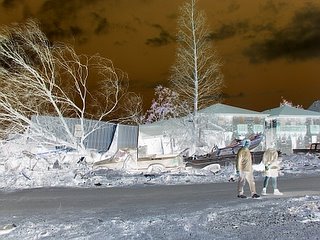
Another negative of a picture showing a street cleared by bulldozers. People walking around, not speaking, as they search for words that will never be found that could possibly describe the destruction.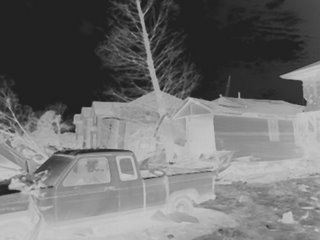
Black and white pictures just don't seem to make the sky dark enough to portray the feeling that lingers over all that can be seen for miles upon miles of destruction. There must be one hell of a silver lining here somewhere.
A color shot of the aforementioned foundation that had supported a families home. Some trees do remain but it will be a while before anyone knows if they will survive the salt water flooding.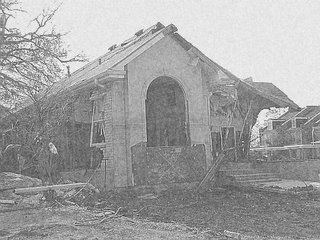
There were many areas where some rather expensive homes were destroyed. Katrina wasn't picky. When New Orleans was founded, the building began of course, on the highest available elevations. As more people moved in, they began to spread out. The farther away from center this expansion took them, the lower the elevation. The highest elevations, therefore the safest elevations from flooding, became the more expensive areas. I don't think this owner feels very safe anymore. If there is one thing people need from a home, it is to feel safe. Until someone with the power to make this city and its people feel safe again, I don't blame them for not wanting to return. I understand that and sympathize. For those that have gotten past that and want to rebuild, I can understand and am willing to help. When people are attacked and assaulted, it takes time to recover. Doors are double bolted. Dark alleys are avoided. Trust takes time to return. Never before has this country had so many millions of people personally assaulted in the first degree. If you think this was not personal, take a look at my other post with the interior pictures of just one home. When death and destruction enter your home, it becomes very personal.
It will take time. It will take a concerted effort by good neighbors, to recover.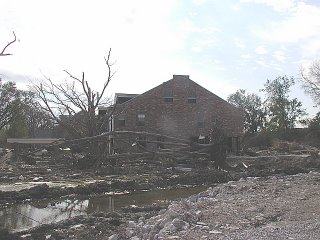
The water along the side of this home is not standing water. It is flowing in from the levee, that is still leaking.
I can think of a whole bunch of bureaucrats that should be forced to head down to the levee and stick their fingers in the holes to stop the leaks. At least they'd be useful in this struggle.
More water and the remains of a home near the levee. The large arm of a crane is visible in the background. The crane is part of the heavy equipment that will be needed to rebuild/repair the levee system
An intact roof and missing walls is a reminder that this damage was not from the wind of Katrina but by the resulting flood. Man-made walls, even of concrete are no match for mother nature's wrath.
I'll huff and puff and blow your house down.....and if that won't work, I'll just wash it away. It just doesn't seem fair to survive the winds of a hurricane and to be then immediately hit with a flood.
The mindset of the people of New Orleans seems a bit different than what I am used to here in the upper Midwest. I guess time will tell if this mindset will, in the end, be exactly what is needed to recover. I understand the concept of "slow and steady." I read the turtle and the hare stories. I guess I've always associated more with the hare.
Chicago once ran a Mayor out of office for not clearing snow from side streets fast enough. It was one of the largest snowfalls in the cities history but it did not matter. The people of Chicago wanted the snow moved and wanted it moved NOW.
I have a feeling that if the same situation occurred in New Orleans, the people would say, oh well, if it doesn't get moved, it will eventually melt, and go about their lives the best they could. Call Lincoln Towing in Chicago. They never met a car they couldn't tow.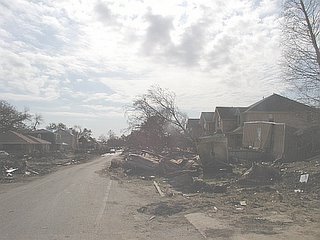 When people have tragedy visited upon them, friends and family are the most important support system they have. Neighbors bring food and shoulder to help people recover. A very large problem with that scenario occurring here, is that New Orleans is a city where all the neighbors suffered the same tragedy. Most of the family members suffered the same tragedy. The fact that families remained so closely knit and lived nearby, so they could always be close by for support, is now the cruelest irony. On the block we were working, four homes were occupied by close relatives. People can not turn to their relatives for a warm meal or bed. Entire family trees were uprooted just as the Ancient Cypress trees were uprooted.
When people have tragedy visited upon them, friends and family are the most important support system they have. Neighbors bring food and shoulder to help people recover. A very large problem with that scenario occurring here, is that New Orleans is a city where all the neighbors suffered the same tragedy. Most of the family members suffered the same tragedy. The fact that families remained so closely knit and lived nearby, so they could always be close by for support, is now the cruelest irony. On the block we were working, four homes were occupied by close relatives. People can not turn to their relatives for a warm meal or bed. Entire family trees were uprooted just as the Ancient Cypress trees were uprooted.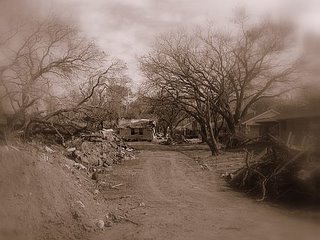
At the end of this now dirt road, is another home in the middle of the street. Maybe it got the mandatory evacuation memo and tied to escape?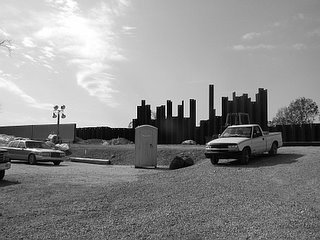 The emergency road that was built to close off the broken section of levee.
The emergency road that was built to close off the broken section of levee.
Behind it is are beginnings of the steel structures needed to make permanent repairs. It hasn't gotten too far at this point. The engineering company, there to build it, was waiting for word from above on exactly how to build it. Will someone PLEASE make a decision? Heavy equipment and the people that know how to use it were just waiting for orders. I guess that's the 100 billion dollar question.
If you want to find some unsung heroes, take a look at the heavy equipment operators that put their lives on the line to close off the breaks during the flooding.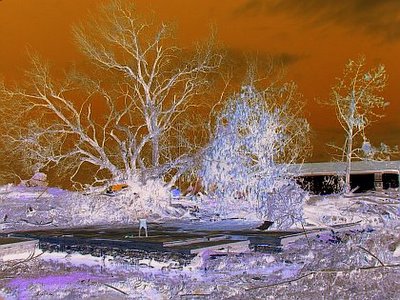
People of New Orleans always have known that what happened was a possibility. I think they also felt that whatever happened, they would survive as a city and recover. People can prepare mentally for what they think may happen. People can put an axe in their attic, just in case. People can not envision living through anything like what actually happened here. Their worst fears were not realized. Their worst fears were greatly surpassed.
Some people in New Orleans are asking, where to start. The place to start has long passed. It seems to me the people of N.O. have been betrayed by a generation of city, and to a lesser extent state, officials. The people charged with the health and safety of it's residents have not only always known this could happen, but it that was happening every day before their very eyes. The city was sinking back in 1971 when they scrapped together 168 million dollars ( a huge sum in the billions in today's money) and built a domed football stadium. They wanted to compete with Houston's Astrodome. The problem with that goal was, Houston was not sinking into the gulf. Stretch out the concrete and steel of the superdome and you'd have miles of levee walls 20 feet tall. Rather than that, they cover 13 acres of some of the highest (safer) ground with one building and parking lots.
Did the people that decided to build the dome, have axes in their attics? Or did the money from this deal allow them to move their families to higher ground?
Yes, the dome proved to be a financial success and made the city millions of dollars. How many of those dollars went into building a levee system that would protect the citizens? Were any of these dollars used to strengthen and protect their vital services? How safe were the police and fire stations? How safe were the emergency vehicles?
They have designed hospitals with their emergency generators in the basements. Did these designers and city officials that approved of the designs, have axes in their attics? Did they go home at night knowing their life saving device was in the attic, knowing the hospital's most important life saving devices were in the basements?
There is an ambulance company in New Orleans that knew the cities emergency services system was inadequate, to say the least. This company knew the cities emergency communications system was unreliable so they built their own towers to insure communications in an emergency. This privately owned communications system was the only one working in the city after the flood and was used by the people saving lives. The cities system wasn't working. This company had more satellite phones than anyone, just in case. These were the phones that saved lives after the flood and helped coordinate the rescue operations, not the cities system. This companies helicopters were used to pull people from their roofs. The employees of this company stayed and saved over 7000 lives. This company felt they had a responsibility to the health and safety of the residents of the city. They were prepared and did their jobs. No, I don't work for them or know anyone that does, although I'd like to meet them some day and shake their hands.
Yes, this disaster produced many heroes. The example above is only about one company with a clear vision of what their responsibility was and they carried it out. Many others were turned from common citizens into extraordinary heroes. There were heroes that wore the cities uniforms, fire, police and others. There were cooks and landscapers and mothers and fathers that became heroes overnight.
Some others that were charged with the responsibility of the health and safety of the citizens of New Orleans failed miserably.
All of this is just the opinion of an outsider. An outsider that will be happy to return and help the people of New Orleans rebuild. There are many good people in New Orleans. Many good reasons to rebuild the city. If asked, I'd happily return to help them clean out the offices of the city fathers. Every one of them that lived in a part of the city that didn't require an axe in the attic, should have their belongings tossed to the curb and hauled to the dump. I happen to know a crew from New Jersey that could handle that mission.
Psiloscribe

<< Home